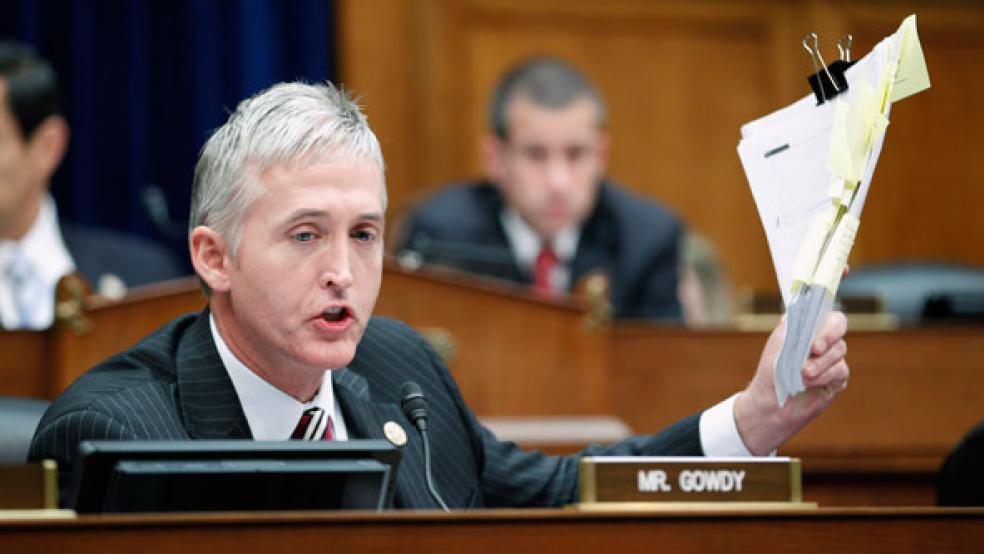There’s real disagreement about whether the House Select Committee on Benghazi began as a purely political effort to embarrass former Secretary of State Hillary Clinton, widely considered the favorite to win the Democratic presidential nomination, or an honest effort to uncover hidden truths about the attack on the U.S. diplomatic compound that killed four Americans in 2012.
What’s not in question anymore is that the committee and its mission have been pulled into the swamp of presidential election politics in the past two weeks in a way that its chair, South Carolina Republican Trey Gowdy, had made Herculean efforts to avoid during the first year and a half of the committee’s existence.
Related: Sensing an Advantage, Clinton Skewers GOP on Benghazi Probe
Things began to go sour for the committee on September 29, when House Majority Leader Kevin McCarthy suggested in a Fox News interview that the panel had been put together specifically to damage Hillary Clinton in the eyes of voters.
“Everybody thought Hillary Clinton was unbeatable, right?” McCarthy said. “But we put together a Benghazi special committee, a select committee. What are her numbers today? Her numbers are dropping. Why? Because she’s untrustable. But no one would have known that any of that had happened had we not fought.”
Gowdy was, reportedly, horrified by the comments, viewing them as negating much of the work he had done to maintain the impression that the select committee was focused solely on finding the truth.
Democrats, including Clinton, took to the media, calling the committee a partisan with hunt that ought to be shut down. Things only got worse last week, when the Democratic members of the committee decided to release part of the transcript of the committee’s interview with a former aide to Clinton, combined with a highly critical letter casting the committee’s work as politically motivated.
Related: Clinton Finally Catches a Break on Benghazi, from the Mis-Speaker of the House
The release of the letter seemed to break some sort of emotional dam within Gowdy, who responded with a 13-page single-spaced letter of his own to the committee’s top Democrat, Maryland Rep. Elijah Cummings.
“For months, you have done nothing but write letters dripping with vitriol and baseless allegations, driven, one would reluctantly conclude, by the desire to create a false partisan narrative,” he wrote. “Your Democrat colleagues and you have contributed nothing substantively to the committee’s investigation over the past 17 months.”
The letter went on at considerable length about the leaks and other Democratic behavior that Gowdy views as detrimental to the committee. However, more than half of the letter is dedicated to an exchange of emails between Clinton and a former Clinton advisor, Sidney Blumenthal, on the subject of the civil war in Libya.
While it is arguable that Clinton’s correspondence with Blumenthal, which seemed to focus on high-level strategies for dealing with Libya is relevant to the Benghazi investigation, it is unclear from the excerpts highlighted by Gowdy that they discussed the attacks specifically.
Related: Clinton Confronts Benghazi Testimony Ahead of Crucial Testimony
What is clear from the letter is why Democrats feel that the committee is a political exercise. Much of the seven-and-a-half pages about Blumenthal is dedicated to repeating some of his more embarrassing comments – such as repeating a colleague’s assertion that former Defense Secretary Bob Gates is “a mean, vicious little prick,” and appearing to advocate for policies that might have been beneficial to a business in which the committee said he holds a financial stake.
The extensive focus on Clinton’s relationship with Blumenthal makes it a bit jarring when, in the final paragraph of the letter Gowdy urges Cummings to “remember why we are here: the promises we made more than a year ago to the families of our fallen heroes.”
However, Gowdy’s problems weren’t over. On Saturday, The Washington Post reported that a former committee staffer, Air Force Major Bradley Podliska, was suing the committee, claiming its leaders had terminated him, in part because he disagreed with what he characterized as an excessive focus on Hillary Clinton.
“My non-partisan investigative work conflicted with the interests of the Republican leadership, who focused their investigation primarily on Secretary Clinton and her aides,” he said in a statement.
Related: After 16 Months and $4.4 Million, Benghazi Panel Still Searching for Charges
Gowdy fired back angrily Sunday, saying that Podliska had been terminated for cause and that his allegations are backwards. Podliska, Gowdy said, was obsessed with investigating Clinton, and was disciplined for it. Further, he said Podliska had not raised the issue in mediation hearings about his firing.
“To wit, until his Friday conversations with media, this staffer has never mentioned Secretary Clinton as a cause of his termination, and he did not cite Clinton’s name in a legally mandated mediation,” Gowdy said in a statement. “He also has not produced documentary proof that in the time before his termination he was directed to focus on Clinton. The record makes it clear not only did he mishandle classified information, he himself was focused on Clinton improperly and was instructed to stop, and that issues with his conduct were noted on the record as far back as April.”
Gowdy concluded his statement saying, ““This Committee always has been, and will be, focused on the four brave Americans we lost in Benghazi and providing the final, definitive accounting of the Benghazi terrorist attacks for the American people.”
Whether or not he will be able to extricate it from the morass of partisan politics is, at this point, an open question.





